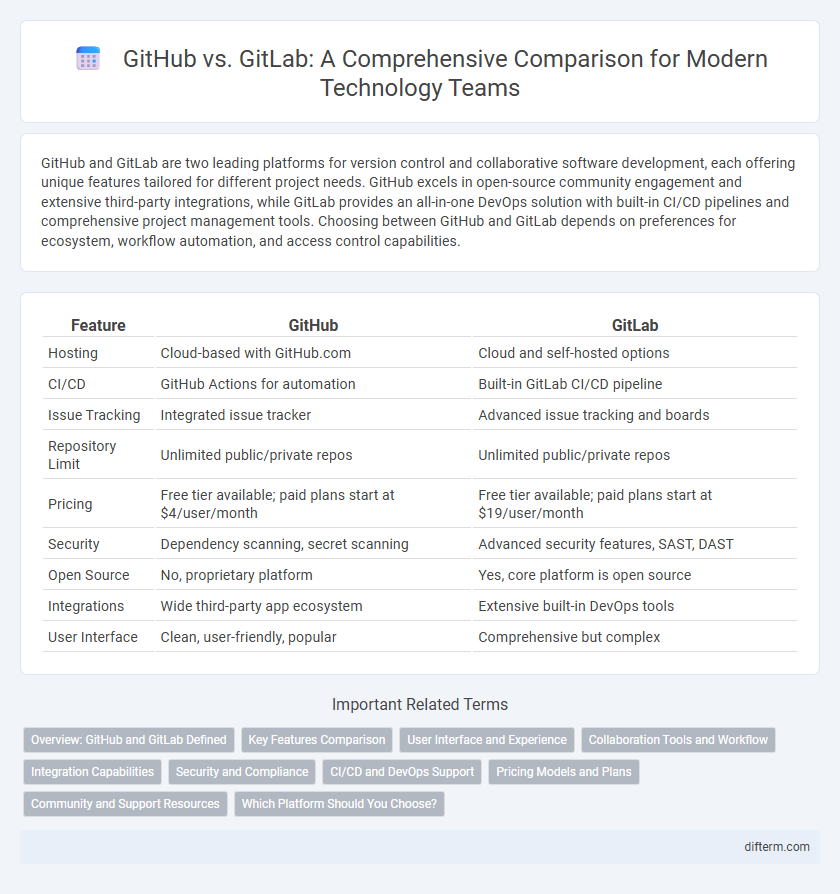GitHub and GitLab are two leading platforms for version control and collaborative software development, each offering unique features tailored for different project needs. GitHub excels in open-source community engagement and extensive third-party integrations, while GitLab provides an all-in-one DevOps solution with built-in CI/CD pipelines and comprehensive project management tools. Choosing between GitHub and GitLab depends on preferences for ecosystem, workflow automation, and access control capabilities.
Table of Comparison
| Feature | GitHub | GitLab |
|---|---|---|
| Hosting | Cloud-based with GitHub.com | Cloud and self-hosted options |
| CI/CD | GitHub Actions for automation | Built-in GitLab CI/CD pipeline |
| Issue Tracking | Integrated issue tracker | Advanced issue tracking and boards |
| Repository Limit | Unlimited public/private repos | Unlimited public/private repos |
| Pricing | Free tier available; paid plans start at $4/user/month | Free tier available; paid plans start at $19/user/month |
| Security | Dependency scanning, secret scanning | Advanced security features, SAST, DAST |
| Open Source | No, proprietary platform | Yes, core platform is open source |
| Integrations | Wide third-party app ecosystem | Extensive built-in DevOps tools |
| User Interface | Clean, user-friendly, popular | Comprehensive but complex |
Overview: GitHub and GitLab Defined
GitHub is a widely adopted platform offering cloud-based Git repository hosting, collaboration tools, and extensive integration with third-party applications, primarily suited for open-source and enterprise software development. GitLab provides a comprehensive DevOps lifecycle solution, featuring built-in CI/CD pipelines, issue tracking, and robust security capabilities, catering to both self-managed and cloud-based environments. Both platforms enable version control and team collaboration, but GitLab emphasizes an all-in-one approach, while GitHub excels with a vast developer community and marketplace integrations.
Key Features Comparison
GitHub offers extensive repository hosting with seamless integration for continuous integration and deployment, social coding features like pull requests and code reviews, plus a vast developer community. GitLab stands out with built-in DevOps lifecycle tools including issue tracking, CI/CD pipelines, Kubernetes integration, and security features such as vulnerability management. Both platforms support Git version control, but GitLab provides more comprehensive out-of-the-box project management and automation capabilities.
User Interface and Experience
GitHub features a clean, intuitive user interface that emphasizes simplicity and ease of navigation, making repository management and collaboration straightforward for developers. GitLab offers a more comprehensive, all-in-one interface that integrates CI/CD pipelines and project management tools directly within the platform, enhancing user experience for teams focused on DevOps. Both platforms prioritize responsive design and customization options, but GitLab's UI is tailored for users seeking in-depth workflow automation, while GitHub excels in streamlined code review and social coding features.
Collaboration Tools and Workflow
GitHub and GitLab both offer robust collaboration tools, with GitHub emphasizing seamless integration with a vast range of third-party applications and a large developer community for issue tracking, code review, and project management. GitLab provides an all-in-one DevOps platform that includes built-in CI/CD pipelines, issue boards, and a comprehensive suite of workflow automation features designed for streamlined end-to-end development cycles. Enterprises often choose GitLab for its unified approach to version control and continuous integration, while GitHub remains popular for open-source collaboration and extensive marketplace integrations.
Integration Capabilities
GitHub offers extensive integration capabilities with over 2,000 third-party applications, including popular tools like Slack, Jira, and Azure DevOps, facilitating seamless workflows for development teams. GitLab provides comprehensive built-in CI/CD pipelines and DevOps lifecycle tools that reduce reliance on external integrations while supporting integrations with key platforms such as Kubernetes and Prometheus. Both platforms emphasize collaboration and automation, but GitHub excels in ecosystem extensibility, whereas GitLab prioritizes an all-in-one integrated experience.
Security and Compliance
GitHub offers advanced security features including automated vulnerability scanning, secret detection, and Dependabot alerts to help identify and remediate risks early in the development cycle. GitLab provides comprehensive compliance management with built-in audit logs, security dashboards, and enforceable code review policies to ensure adherence to industry standards like SOC 2 and GDPR. Both platforms integrate with third-party security tools, but GitLab's end-to-end DevSecOps approach offers a more unified solution for continuous security and compliance monitoring.
CI/CD and DevOps Support
GitHub and GitLab both offer robust CI/CD pipelines integral to modern DevOps workflows, but GitLab provides a more comprehensive, built-in solution with native support for automated testing, deployment, and monitoring. GitLab's unified DevOps platform enhances collaboration through integrated issue tracking, container registry, and security scanning features, while GitHub relies heavily on third-party integrations like Actions and external tools for extended functionality. Enterprises seeking an all-in-one DevOps environment often prefer GitLab for its seamless experience, whereas GitHub's extensive ecosystem appeals to users prioritizing flexibility and community-driven support.
Pricing Models and Plans
GitHub offers a free tier with unlimited public and private repositories, while its paid plans start at $4 per user per month, featuring advanced collaboration and security tools. GitLab's pricing begins with a free core version focused on basic CI/CD and issue tracking, scaling up to Premium and Ultimate plans priced at $19 and $99 per user per month, respectively. Both platforms provide enterprise options tailored for large organizations requiring enhanced compliance, project management, and support capabilities.
Community and Support Resources
GitHub hosts one of the largest developer communities globally, providing extensive support through forums, extensive documentation, and numerous third-party integrations. GitLab offers a tightly integrated community experience with built-in support features, comprehensive documentation, and active collaboration channels aimed at DevOps teams. Both platforms provide robust support resources, but GitHub's widespread adoption fosters a broader and more diverse user-driven knowledge base.
Which Platform Should You Choose?
GitHub offers a vast open-source community and extensive integration options, making it ideal for collaborative projects and public repositories. GitLab provides a complete DevOps lifecycle with built-in CI/CD pipelines and advanced security features, suited for enterprises seeking all-in-one solutions. Choosing between GitHub and GitLab depends on your workflow needs, preferred collaboration style, and specific project management requirements.
GitHub vs GitLab Infographic

 difterm.com
difterm.com